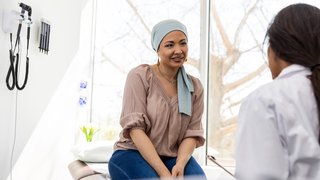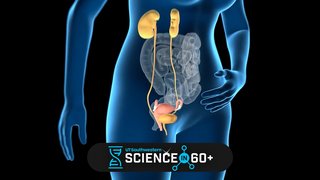Breaking the silence about endometriosis
February 22, 2024

March is Endometriosis Awareness Month, a welcome opportunity to shine a light on an under-reported, under-discussed condition that affects 1 in 10 women – an estimated 176 million worldwide.
Comedian Amy Schumer is one of those women, and in February she responded to misguided and, in some cases, cruel social media comments about her "puffy face" during an appearance on "The Tonight Show" by explaining on Instagram: "I have endometriosis, an autoimmune disease that every woman should read about."
The 42-year-old star of "Life and Beth" on Hulu added that she was recently diagnosed with Cushing's syndrome, a hormonal disorder that can cause weight gain in the face and body.
Endometriosis, which has been called a “Silent Epidemic,” often presents as pain accompanying periods, chronic pelvic pain, or pain during sex. The condition occurs when tissue similar to endometrial tissue, which normally forms the inner lining of the uterus, grows in other places in the body – most commonly in the pelvis, on ovaries, fallopian tubes, bowel, and bladder but also sometimes in the lungs, nose, and almost every other organ.
Ms. Schumer's experience is just the latest example of the need for more awareness and understanding about endometriosis.
Diagnosing and treating endometriosis
Endometriosis can be challenging to diagnose and, at times, even more challenging to treat. Unlike other gynecologic conditions, we don’t have great diagnostic tools for endometriosis – there isn’t a specific blood test or an imaging study that can definitively confirm the condition – so it can be difficult to pinpoint.
The diagnosis can be further confused by overlapping conditions with similar symptoms, such as fibroids, adenomyosis, and irritable bowel disease. Endometriosis is definitively diagnosed through a minimally invasive surgery with a tissue diagnosis after lesions are removed.
Despite how many individuals are affected by endometriosis, the diagnosis is usually delayed because, all too often, it isn't top of mind for some physicians (pediatricians, ER doctors, and general adult primary care providers, for instance).

For many patients, it can take up to 10 years to receive the correct diagnosis of endometriosis. This long delay often means seeing countless specialists, being subjected to multiple tests and studies, going through failed therapies, and enduring years of unnecessary distress and suffering. It also means that, meanwhile, the condition progresses over this time, and this can lead to infertility, persistent pain, or dysfunction of organs such as the bowel and bladder.
The main reasons endometriosis can be a challenge to diagnose is because symptoms vary between affected individuals and can change. For some, pain is terrible with periods; for others, the pain is constant and unrelated to periods. The type of the pain can vary, too, ranging from crampy pain in the middle of the abdomen, to sharp and shooting pain on one side. For some, the pain happens during sex; for others, it accompanies bowel movements. Also too often, women and girls don’t talk about it, or learn not to bring it up.
Related: Do you have endometriosis? Why your heart may be at risk
At UT Southwestern, our endometriosis specialty providers favor a minimally invasive (laparoscopic and robotic) approach to the complete removal, or resection, of all visible disease to try to optimize surgical outcomes. Our gynecologists often partner with colleagues in colorectal surgery if endometriosis is found in the bowel. For patients seeking future fertility, our surgeons aim to restore anatomy, clear out endometriosis and endometriomas while conserving and preserving reproductive function.
While there is no "cure" for endometriosis, combined with surgery, symptoms may often be managed with hormonal medications such as progesterone medications (IUD, oral), oral contraceptives, and GnRH agonists. Because chronic pain and endometriosis can have impacts on physical functioning, our Endometriosis Specialty Practice frequently partners with the Department of Physical Medicine and Rehabilitation through their Pelvic Rehabilitation Program in order to optimize quality of life and functioning.
Speak up, be heard
I frequently meet patients who were told that painful periods are just a normal part of being a woman. There tends to be a “grin and bare it” mentality in which girls and teens are advised at an early age to put on baggy sweatpants, grab a heating pad, take some Pamprin, and wait out the pain.
The (incorrect) message is, “Pain is normal, so stop talking about it.”
As women get older, they become accustomed to minimizing their experience. Padma Lakshmi, host of TV’s “Top Chef,” said, "I think . . . I hid it to a certain degree – not intentionally but, you know, it’s weird to talk about your period all the time. It’s like the least sexy thing in the world to do.” So women often decide to downplay their pain and their symptoms, leading others to do so as well.
The point I want to make is that it is not normal to have to miss activities such as work, school, sports, or social outings because of pelvic pain – or for it to interfere in our lives negatively at all. I encourage everyone to speak up, be heard, and seek care from someone who will listen. Only then can we start making the right diagnosis and start treating the condition. Unvalidated and unrecognized pain in general can lead to a host of other conditions, including depression.
Ms. Schumer's message to her social media critics and followers makes a couple of very important points:
Educate yourself and "take the opportunity to advocate for self love and acceptance of the skin you’re in."
While there is no cure for endometriosis, experts in the treatment of this condition understand the medical, surgical, musculoskeletal, and psychological care that is required to break the cycle of pain.

At UT Southwestern, we have doctors whose practices focus on the long-term treatment of endometriosis and related conditions.
“Every patient with endometriosis deserves an opportunity to be heard, supported, and healed,” says Dr. Jessica Shields, a fellowship-trained faculty member whose specialty is minimally invasive gynecologic surgery. “While treating this condition can be challenging, it is always rewarding when the cycle of pain is broken and no longer the center of daily life.”
Think about 10 women you know, love, or work with. One of them is probably suffering from endometriosis. Encourage them to talk about their experiences and seek care with specialists trained to treat endometriosis. We need to break the silence about this epidemic.
If you want to learn more about endometriosis or treatments for this condition, call us at 972-695-9326 or request an appointment online.













